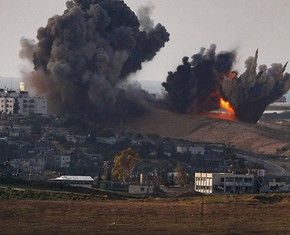The views expressed in our content reflect individual perspectives and do not represent the authoritative views of the Baha'i Faith.
In 1912 the Japanese Ambassador to Spain and his wife, during the last day of their visit to Paris, learned of Abdu’l-Baha’s presence in the city – and very anxiously wanted to meet him.
Unfortunately the ambassador’s wife was recovering from a severe cold and couldn’t leave their hotel – and they were scheduled to leave for Spain early the next morning.
When Abdu’l-Baha found out about the situation, he decided to pay them a visit, even though he was exhausted from a long and tiring day. During the ensuing discussion with the ambassador, Abdu’l-Baha made a startlingly prescient observation:
Scientific discoveries have increased material civilization. There is in existence a stupendous force, as yet, happily undiscovered by man. Let us supplicate God, the Beloved, that this force be not discovered by science until spiritual civilization shall dominate the human mind. In the hands of men of lower nature, this power would be able to destroy the whole earth.
RELATED: Baha’u’llah’s Nine Modes of Discourse – Including Prophecies
This statement most likely referred to the same force which Baha’u’llah had alluded to years before in his writings:
Strange and astonishing things exist in the earth but they are hidden from the minds and the understanding of men. These things are capable of changing the whole atmosphere of the earth and their contamination would prove lethal.
More than a decade later, in 1925, the British physicist and Nobel Laureate Patrick Blackett would observe the first nuclear reaction, transmuting an isotope of nitrogen into an isotope of oxygen.
This work helped pave the way for the discovery of man-made nuclear transmutation in 1932 by Ernest Walton and John Cockcroft, who by accelerating and bombarding protons against lithium-7 successfully split its nucleus, finally realizing the age-old alchemical quest to transmute elements.
In 1938 the German scientists Otto Hahn, Lise Meitner, and Fritz Strassman achieved nuclear fission of uranium. This technology would form the basis for the development of the atomic bombs which were dropped on Hiroshima and Nagasaki at the close of World War II. It would also cast the world perilously close to brink of annihilation as the nuclear-armed superpowers faced off during the years of the Cold War, and still holds an omnipresent threat over humanity whenever nations come into conflict and as the capacity for creating nuclear weapons proliferates.
Recently, with the Russian invasion of Ukraine, that threat has once again risen to the forefront of the world’s consciousness. Surely Abdu’l-Baha’s warning to the Japanese Ambassador referred to the future discoveries of nuclear physics and their weaponization – a result of which Japan would later suffer as the first victim of this terrible force.
This and many other examples show that Baha’u’llah’s revelation anticipated the world-shaking technological impacts unleashed on humanity during the 19th and 20th centuries. Indeed, Baha’u’llah and later Abdu’l-Baha, throughout their lives, made many startlingly accurate predictions of future events, such that they truly qualify as “prophets” in the literal sense of that word.
Prominent examples of Baha’u’llah’s factual forecasts include the collapse of the Turkish Sultanate; the downfall of Sultan Abdu’l-Aziz and the demise of various other prominent figures of the Ottoman Empire; the end of Napoleon III’s rule; and the outbreak of devastating wars in Europe, including the defeat of the German Reich in World War I.
RELATED: Baha’u’llah’s Announcement – and Warnings – to the Kings
In general, Baha’u’llah predicted the collapse of the ascendant monarchies and clerical powers across the world and the rise of atheism and irreligion as well as the growth of global institutions of governance – all with astounding prescience.
While the Baha’i teachings describe these seemingly outright miracles as constituting a very marginal level of proof, only possibly applicable to those who might be firsthand witnesses, Baha’is do accept the power of prophecy. In fact, one of the most prominent Islamic scholars to embrace the Baha’i Faith – Mirza Abu’l-Fadl – did so because of those prophecies. In 1876 Abu’l-Fadl read two of Bahaʼu’llah’s tablets, in which he foretold the downfall of the Ottoman Sultan Abdu’l-Aziz and his vizier Ali Pasha. When those events occurred a few months later, Abu’l-Fadl accepted Bahaʼu’llah’s claims and became one of the foremost advocates of his new religion.
This ability to predict the future, an interesting capacity of individuals like Moses, Jesus, and the many other founders of great religions, explains why many commonly refer to them as “prophets.” This ability functions both as a validation for those who doubt their mission, and perhaps as an innate mechanism that helps God’s messengers construct new social orders. By structuring their teachings and laws to anticipate the changes in human society, they help organize it. Scientifically, the ability to predict the future behavior for any given system is directly linked to the capacity to order it.
In the next essay we will explore, as several researchers have suggested, how the ability to predict is also thought to be linked to the very processes of life and evolution.
















Comments
Sign in or create an account
Continue with Googleor